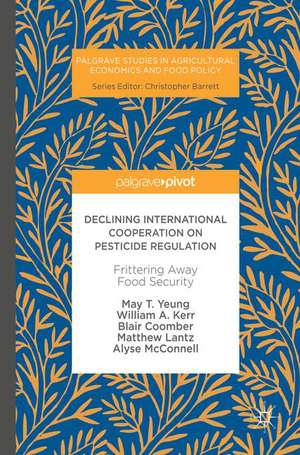Declining International Cooperation on Pesticide Regulation: Frittering Away Food Security: Palgrave Studies in Agricultural Economics and Food Policy
Autor May T. Yeung, William A. Kerr, Blair Coomber, Matthew Lantz, Alyse McConnellen Limba Engleză Hardback – 28 iul 2017
Din seria Palgrave Studies in Agricultural Economics and Food Policy
-
 Preț: 252.04 lei
Preț: 252.04 lei -
 Preț: 246.95 lei
Preț: 246.95 lei - 17%
 Preț: 361.34 lei
Preț: 361.34 lei -
 Preț: 266.14 lei
Preț: 266.14 lei - 18%
 Preț: 733.15 lei
Preț: 733.15 lei - 18%
 Preț: 897.95 lei
Preț: 897.95 lei - 18%
 Preț: 778.13 lei
Preț: 778.13 lei - 15%
 Preț: 582.95 lei
Preț: 582.95 lei -
 Preț: 218.98 lei
Preț: 218.98 lei - 15%
 Preț: 701.25 lei
Preț: 701.25 lei - 18%
 Preț: 783.98 lei
Preț: 783.98 lei -
 Preț: 485.07 lei
Preț: 485.07 lei - 18%
 Preț: 949.73 lei
Preț: 949.73 lei - 18%
 Preț: 777.35 lei
Preț: 777.35 lei -
 Preț: 359.38 lei
Preț: 359.38 lei - 18%
 Preț: 780.19 lei
Preț: 780.19 lei -
 Preț: 360.92 lei
Preț: 360.92 lei - 18%
 Preț: 729.53 lei
Preț: 729.53 lei
Preț: 417.90 lei
Nou
Puncte Express: 627
Preț estimativ în valută:
79.99€ • 86.92$ • 67.24£
79.99€ • 86.92$ • 67.24£
Carte tipărită la comandă
Livrare economică 21 aprilie-05 mai
Preluare comenzi: 021 569.72.76
Specificații
ISBN-13: 9783319605517
ISBN-10: 3319605518
Pagini: 127
Ilustrații: XXI, 127 p. 2 illus.
Dimensiuni: 148 x 210 mm
Greutate: 0.34 kg
Ediția:1st ed. 2017
Editura: Springer International Publishing
Colecția Palgrave Macmillan
Seria Palgrave Studies in Agricultural Economics and Food Policy
Locul publicării:Cham, Switzerland
ISBN-10: 3319605518
Pagini: 127
Ilustrații: XXI, 127 p. 2 illus.
Dimensiuni: 148 x 210 mm
Greutate: 0.34 kg
Ediția:1st ed. 2017
Editura: Springer International Publishing
Colecția Palgrave Macmillan
Seria Palgrave Studies in Agricultural Economics and Food Policy
Locul publicării:Cham, Switzerland
Cuprins
1. Why Maximum Residue Limits for Pesticides are an Important International Issue.- 2. The Importance of Trade for Food Security.- 3. Incentives, or Not, for Governments to Remove Asynchronous MRLs as Trade Barriers.- 4. The Economics of International Harmonization of MRLs.- 5. Previous Examinations of MRLs.- 6. Case Studies of Trade Problems Related to MRLs.- 7. What Do Administrators Say?.- 8. Institutional Initiatives to Deal with Internationally Asynchronous MRLs.- 9. The Way Forward.
Notă biografică
May T. Yeung is Professional Affiliate at the University of Saskatchewan, Canada.
William A. Kerr is University Distinguished Professor at the University of Saskatchewan, Canada.
Blair Coomber is former Director General of International Trade Policy at Agriculture and Agrifood Canada.
Matthew Lantz is Vice President of Global Access at Bryant Christie Inc., USA.
Alyse McConnell is Manager of International Regulatory Affairs at Bryant Christie Inc., USA.
Textul de pe ultima copertă
This Palgrave Pivot investigates barriers to international agricultural trade caused by a lack of standardized maximum residue levels (MRL) for pesticides. As upwards of ninety percent of the food entering international supply chains will show pesticide residues, this issue poses a serious threat to global food security. Given the preponderance of pesticide use in food production and the increasing disruptions to trade, a better understanding of the reasons for the decline in international cooperation, the trade impacts, and potential solutions is critical. This volume will contribute to that understanding. Through an analysis of the economics of MRL regulatory harmonization, select case studies, and a look at incentives and disincentives for government agencies and regulators, the authors move the conversation beyond the theoretical, and into current practices and advice for creating workable solutions. This Pivot is a valuable resource for those concerned with food security, trade policy, agricultural production and export supply chains, as well as those interested in broader issues related to science policy and societal trends.
Caracteristici
Combines multidisciplinary knowledge and experience from academia, government, and private industry Provides select MRL case studies Features interviews with government policy makers and practitioners Includes supplementary material: sn.pub/extras
